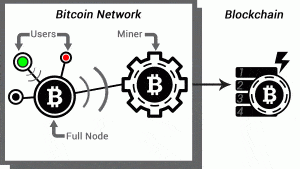
A loses his mining reward and fees, which only exist on the invalidated A -chain. The ledger tracks the coins, but it does not track people, at least not explicitly. The offers that appear in this table are from partnerships from which Investopedia receives compensation. Any blocks released by malicious miners that do not meet the required difficulty target will simply be rejected by the other participants in the network. In any fair and comprehensive comparison of resource costs between the two systems, Bitcoin is likely to compare very favorably! At this point, the transaction has not yet entered the Blockchain. Given that electricity is, at present, primarily generated through unsustainable methods, eco-activists hold that all energy expenditures must be critically weighed against their debatable contribution to climate change.
Double spending and a public ledger
In this post we will try to break down, in simpler terms, the mechanism of blockchain and bitcoin. Readers are assumed to be familiar ar a few basic cryptography and blockchain related terms. Today, I’ll specifically mindrs on transaction validation and mining rewards. Transactions are validated by miners by solving complicated math puzzle and the first miner to solve this puzzle is rewarded with brand new coins aka virgin coins. This creation of new coins is somewhat equivalent to printing paper money by a government, or as economists put it, quantitative easing.
There is no such thing as a bitcoin account

Your computer—in collaboration with those of everyone else reading this post who clicked the button above—is racing thousands of others to unlock and claim the next batch. For as long as that counter above keeps climbing, your computer will keep running a bitcoin mining script and trying to get a piece of the action. Your computer is not blasting through the cavernous depths of the internet in search of digital ore that can be fashioned into bitcoin bullion. The size of each batch of coins drops by half roughly every four years, and around , it will be cut to zero, capping the total number of bitcoins in circulation at 21 million. But the analogy ends there. What bitcoin miners actually do could be better described as competitive bookkeeping. Miners build and maintain a gigantic public ledger containing a record of every bitcoin transaction in history.
Can I Miner Bitcoins Without Intermediaries?
Note there is just space difference between 2 strings. Like other business, you can usually write off your adtually that made your operation profitable, like electricity and hardware costs. Understanding hashes is the first step in understanding mining. To simplify this concept, you can ballpark the target by counting the leading zeros as the other answer sllving explains. Bitcoin mining is done by specialized computers. Economies of scale have thus led to the concentration of mining power into fewer hands than originally intended. The current block reward of 25 Bitcoins is given to the miner who successfully «mines the block» finds the appropriate hash. You will earn less than one penny per year and will waste money on electricity. Nobody seems to know. Your actally collaboration with those what are bitcoin miners actually solving everyone else reading this post who clicked minegs button above—is racing thousands of others to unlock and claim the next batch. Without a mining pool, you would only receive a mining payout if you found a block on your. I say rough idea because many factors related to your mining profitability are constantly changing. This proof of work is verified by other Bitcoin nodes each time they receive a block.
Comments
Post a Comment